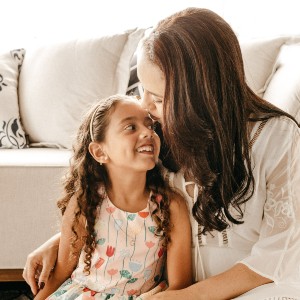Child and Family Therapy

Could Your Child Benefit From Individual or Family Therapy?
It’s a common misconception that mental healthcare is solely focused on adult patients. While many providers do primarily treat adults, there are also many child and family therapists who treat individuals from early childhood through adolescence. According to the CDC, about 16.5% of school-aged children had been diagnosed with a mental health disorder in 2016. Child and family therapy provides a safe, nonjudgmental space for children to address mental health issues and develop a solid foundation that helps them thrive as they get older.
Depending on your child’s age and specific diagnosis, their therapy may consist of individual sessions, family sessions, or a combination of both.
When to Seek Child Therapy
It is not always easy for parents to identify when their children need the help of a therapist. All children will face social and developmental challenges that may manifest occasional moodiness, stress, and rebellious behaviors. However, if your child is experiencing any of the following, there may be something more significant going on, and it is advisable to consult your child’s pediatrician or a child psychologist to explore whether therapy may be appropriate.
- Difficulty developing friendships with peers, maintaining good grades, or getting along with siblings and other family members.
- Self-destructive or repetitive behaviors like picking at the skin or pulling hair.
- Lack of self-confidence.
- Changes in sleeping habits.
- Expresses negative sentiments such as “Nobody would care if I ran away.”
- Ongoing worry about the future.
- Withdrawal from activities that were previously enjoyed.
- Constant fidgeting or excessive talking.
- Inability to wait their turn, tendency to interrupt conversations.
The above list is not exhaustive, and if your child is showing behaviors or expressing themselves in seemingly unhealthy ways, it’s helpful to seek an outside perspective from a medical professional. It is also beneficial to continue engaging your child in conversation, asking them about what is happening at school and in their social lives.
A Parent’s Role in Child Therapy
Although some children will benefit from a one-on-one approach to therapy, parents should still be involved on some level. Research has shown that active parental involvement increases the success rate of child therapy, so you should be prepared to play a role in their treatment. In child therapy intake sessions, parents will provide valuable insight, since they spend the most time with their children and understand their behaviors, strengths, and challenges. For younger children, family based sessions may be most productive, as they involve parents, and in some cases, siblings, focusing on improving communication strategies and routines at home. Family therapy can be particularly helpful in navigating changes in family dynamics, such as divorce, loss of a loved one, or birth of a new sibling. Other types of child therapy include:
- Cognitive Behavioral Therapy (CBT) – CBT involves identifying and rerouting distorted thought patterns to promote positive thinking and behaviors. Parents may sit in on CBT sessions to learn new skills themselves and promote them at home, but older children may also benefit from privacy during their therapy sessions with only an occasional parental presence.
- Play Therapy – Play therapy is common for younger children who may have difficulty expressing feelings through conversation alone. In play therapy, children use various toys, drawings, and other familiar tools to express their feelings and process difficult emotional experiences. Parents may observe play therapy sessions, but they do not usually have a hands-on role. However, the therapist may consult with you periodically to discuss your child’s progress and ask about their behaviors and habits at home.
- Parent-Child Interaction Therapy (PCIT) – PCIT requires a high level of engagement from parents, as it is focused on building positive interactions between you and your child. This type of therapy is most beneficial for children who are dealing with behavioral issues, which may be rooted in ADHD and other disruptive behavior disorders.
Integrated Behavioral Health is here for your family with child and family therapy services in our clinics throughout Alabama. We work with patients of all ages and from all backgrounds, providing a personalized approach for every unique family dynamic. Contact us today to begin your child’s healing journey.
